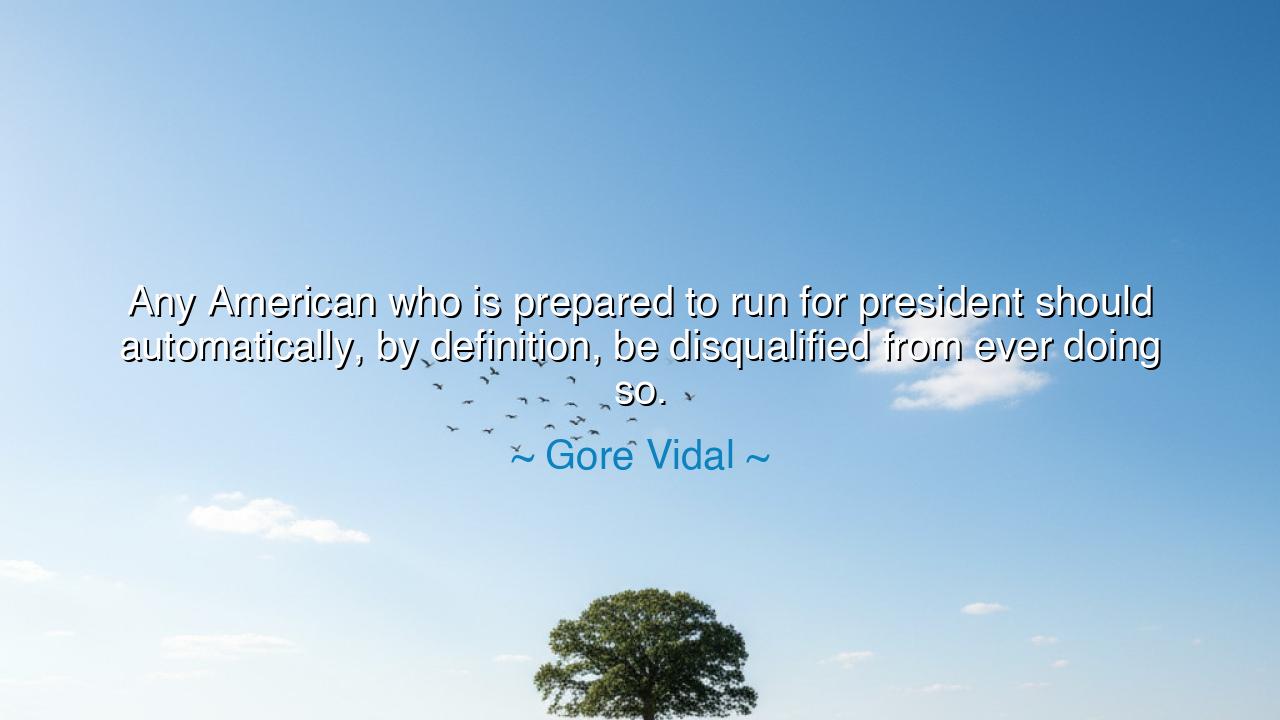
Any American who is prepared to run for president should
Any American who is prepared to run for president should automatically, by definition, be disqualified from ever doing so.






The words of Gore Vidal, “Any American who is prepared to run for president should automatically, by definition, be disqualified from ever doing so,” shine with biting irony yet carry the weight of ancient wisdom. In them lies the suspicion that the thirst for power corrupts, and that the very desire to grasp the highest office marks a soul as unfit to wield it. For who seeks such a throne with eagerness, save those already captive to ambition?
The ancients knew this truth well. In Plato’s Republic, the philosopher warned that those most hungry for rule are least worthy of it, for their hearts are governed by desire, not justice. The true guardian, he taught, is one who accepts power reluctantly, as a burden rather than a prize. Vidal’s words echo this same timeless warning: beware those who clamor for the crown, for the crown will magnify their flaws.
History itself offers the tale of George Washington, who, after victory in the Revolution, was begged to become king. He refused the diadem, taking instead the reluctant role of president, and twice laid it down willingly. His greatness was not in seeking power, but in shunning it, proving that true leadership arises not from hunger for authority, but from devotion to duty. Washington stands as the living contradiction to Vidal’s cynicism: rare indeed is the leader who does not crave the throne.
By contrast, many rulers throughout the ages—Caesars, emperors, dictators—clawed their way to power through intrigue, blood, and endless schemes. They were fully “prepared” for rule, and it was their very preparedness—their cunning, ambition, and thirst—that made them dangerous. Here lies the heart of Vidal’s wit: to be ready, eager, and willing to ascend may be the surest proof of unworthiness.
So let this teaching be remembered: the noblest rulers are not those who seek office, but those who accept it only when called, and who surrender it when their duty is done. Ambition makes men fit for conquest, but unfit for stewardship. The people must therefore discern wisely, lest they crown those whose desire for the presidency proves they are the very ones who should never hold it. For the highest office is not a prize for the ambitious, but a burden for the just.






ND06. Le Nguyen Dung
Vidal’s quote touches on a cynical view of the American political system, implying that anyone who is eager to hold such power might be untrustworthy. Is it possible that the very nature of running for president fosters qualities we don't want in a leader, like ego or ambition? Or is Vidal simply voicing frustration with the current state of politics, where those who run for office often seem detached from the people they serve?
QHNguyen Quynh Huong
This quote feels like a critique of the entire structure of American politics. Vidal seems to be saying that the desire to be president inherently disqualifies someone from being fit for the job. But could that be too extreme? Is it possible for someone to be genuinely motivated by a desire to serve, or does the pursuit of such high office always come with self-interest?
HLHa Linh
Vidal’s statement is certainly provocative, but it raises a critical question about ambition and leadership. Should we view anyone who seeks the presidency with suspicion? Or is it more of a comment on how the American political system tends to favor those with extreme ambition and personal drive, which might not always be the qualities we need in a leader?
CAN05.03 Doan Chi A3
Gore Vidal’s quote seems to express a deep skepticism about the nature of political ambition, particularly in the context of the presidency. Is this a reflection of how the pursuit of power itself can corrupt a person? If someone is actively seeking such a high office, does it mean they are inherently unfit for the role? Or could it just be a critique of the political system that encourages such ambition?